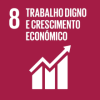The blindness of a colonialist heritage or an arrogant outlook cannot overshadow the opposite, which is the opening up of the European market
Sustainable Development Goals (SDG)






Jorge Bruno
In December, the European Union and the Southern Common Market (Mercosur) signed a trade agreement that establishes a strategic partnership between two parts of the globe that share a common heritage of relationships spanning several centuries. Twenty years of negotiations culminated in an important moment for the economies involved through an increase in the internationalisation potential of commercial players on both sides. And if this agreement marks the inaugural moment of a European geopolitical shift, adapted to the challenges of what is anticipated to be the new world order, then the moment is truly historic for promoting a new European dynamic. Only then will Europe cease to be the old lady sitting on a throne of history, with a worn-out symbolism and no significance.
Mercosur is an organisation comprising Brazil, Argentina, Uruguay, and Paraguay. Bolivia is in the process of joining, and Venezuela is suspended from its rights and duties despite being part of this bloc. The four countries currently making up Mercosur have a total population of approximately 270 million. All these people become closer to European companies/brands. It is a new market that becomes more accessible to the European economy. The projected savings of 4 billion euros per year in customs duties is a significant boost for those wishing to enter these American markets and a great help for those already present.
It is impossible not to highlight the presence of Brazil, the largest economy in Latin America, within this bloc. In the Americas, it is only surpassed by the economy of the United States of America. Furthermore, it possesses a wealth of natural resources that are important and necessary for the green and digital transition.
With this agreement between the European Union and Mercosur, the world’s largest trading zone is born. The blindness of a colonialist heritage or an arrogant view cannot overshadow or disregard the opposite sense, which is the opening of the European market to companies originating from the Mercosur economies. This is also a challenge for Europe and has caused some protests and distrust regarding the signed agreement, particularly from French authorities and farmers. With this partnership, Europe opens itself to strategic latitudes, with Portugal holding a privileged geographical position to act as a gateway to both blocs. Through the structure and dynamics conferred by its membership in the European Union, our country can stand out in the realisation of an Atlantic nation with an even more Europeanist outlook without turning its back on the sea. The country’s coastal dimension assumes a preeminent role in a geostrategic policy that Europe urgently needs to implement. Hopefully, we, the Portuguese, can rise to the opportunities that lie ahead and, as Europeans, know how to create strategic dynamics to address the current challenges. Responses are needed to the positions of the United States, particularly those that are emerging from an administration soon to take office, and those of China and Russia. It is believed there are several political instruments capable of achieving this without resorting to arms. Will is required.
Agreements made between blocs aim for mutual understanding in a space of differences, particularly economic and cultural. Unification between countries structured in supranational entities that symbolise globalisation or, as the more sceptical call it, internationalisation. The reduction or elimination of customs barriers, which resemble borders, is the opposite of an isolationist stance, which is sometimes mistaken for protection. Borders have always known space for escaping illegality, sometimes justified in a flight to freedom. Trade has smuggling as an escape route from these borders. As evidenced by our border region. Never has a border failed to provide an escape route. Denis Diderot, an 18th-century French philosopher and writer, in a letter about the book trade dated 1763 wrote: “You may dot, dear sir, the whole extent of your borders with soldiers, arm them with bayonets to repel any possible threats, but these books, if I may be so bold, will pass between their legs and, jumping over their heads, will know how to reach us.”
Trade, often at the heart of agreements between blocs and countries, is synonymous with bringing peoples and communities closer together. Commercial exchanges only occur between those who understand each other and reach agreements. This characteristic of trade is validated by its contribution to bringing nations closer and breaking down borders. It forms a Universal Mercantile Republic with the ability to unite people, create economic communities, and foster the emergence of consumers who are crucial for the dynamism of economies and for improving the living conditions of individuals.
A word of appreciation for the work of MEP Hélder Sousa Silva, President of the EU – Brazil Delegation, the entity promoting the relationship between these two parts, which plays a significant role in the dynamics promoted by the EU – Mercosur agreement.
Jorge Bruno Ventura
University Professor
Director of the Bachelor’s in Communication Sciences – School of Communication, Architecture, Arts and Information Technologies at Lusófona University - Lisbon University Centre.
Source: SOL











